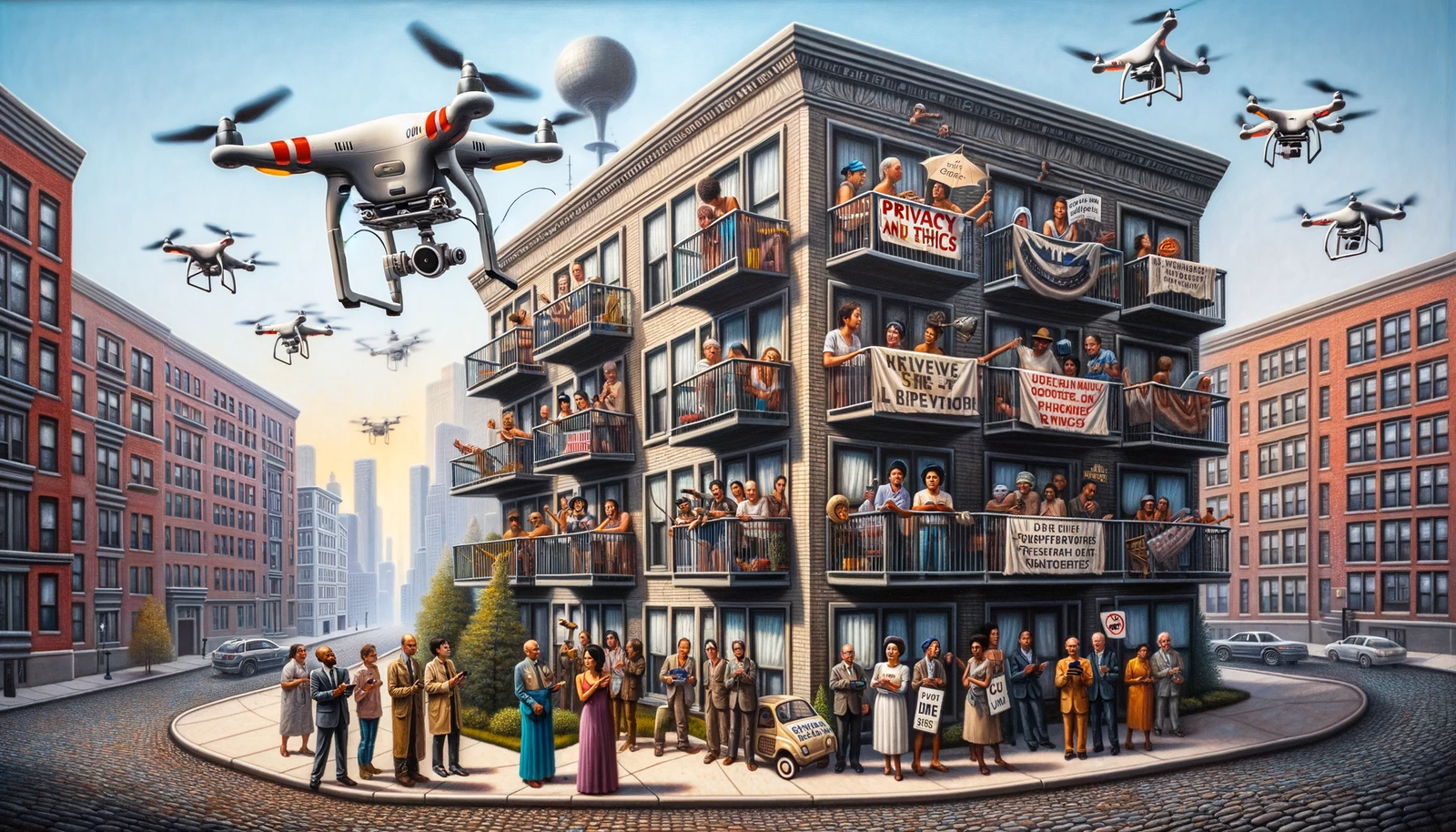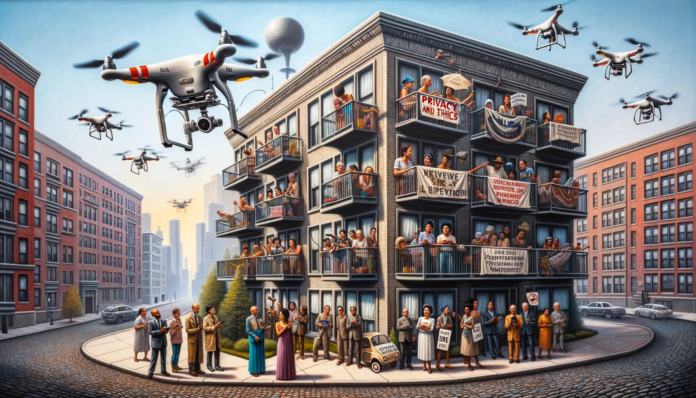
Imagine soaring through the sky, gliding effortlessly above landscapes and capturing breathtaking views. Now, picture this experience being shared not only by pilots but by small unmanned aircraft called drones. These flying cameras have taken the world by storm, revolutionizing industries and changing the way we see the world. However, with this technological advancement comes a pressing concern: privacy and ethics. In this article, we will take a closer look at the implications of drones on personal privacy and the ethical dilemmas that arise in their use. Get ready to explore the intersection of technology and personal boundaries, as we navigate the intricacies of privacy and ethics in the age of drones.
The Rise of Drones
Introduction to drones
Drones, also known as unmanned aerial vehicles (UAVs), have become increasingly prevalent in today’s society. These small, remote-controlled aircraft have gained popularity due to their wide range of uses and applications. From recreational flying to professional photography, drones have proven to be versatile tools. However, their widespread use raises concerns about privacy, as they have the potential to invade personal space and violate privacy rights.
Uses and applications of drones
Drones have revolutionized various industries, bringing significant benefits and advancements. In agriculture, they are utilized for crop monitoring, assessing irrigation needs, and even delivering small packages. In the field of filmmaking and photography, drones have allowed for stunning aerial shots that were previously unattainable or required expensive equipment. Additionally, drones have been used in search and rescue missions, disaster relief efforts, and environmental monitoring. Despite the positive contributions, the potential impact on privacy cannot be overlooked.
Privacy Concerns
Invasion of privacy through aerial surveillance
One of the primary concerns surrounding the use of drones is their ability to conduct aerial surveillance, which can potentially intrude upon individuals’ privacy. Drones equipped with cameras or other sensing technologies can easily capture images or videos without the knowledge or consent of those being observed. This invasion of privacy raises ethical questions about the extent to which drone operators should be allowed to monitor and record activities in private spaces.
Violation of personal privacy rights
The use of drones for surveillance purposes raises significant concerns about violating personal privacy rights. People have a reasonable expectation of privacy within their homes or other private spaces, and the intrusion of drones equipped with high-resolution cameras or thermal imaging sensors can infringe upon this right. The gathering of personal information without consent or knowledge undermines individuals’ privacy and autonomy.
Legal Regulations
Current laws regarding drone use
Governments worldwide have recognized the need to address the potential privacy concerns associated with drone operations. As a result, many countries have established regulations governing drone usage. These laws often require drone operators to register their aircraft, follow specific flight restrictions, and maintain a minimum distance from people and property. By implementing such regulations, authorities aim to strike a balance between enabling the beneficial applications of drones while ensuring privacy protection.
Restrictions on drone surveillance
To address privacy concerns, some jurisdictions have imposed additional restrictions on drone surveillance activities. These restrictions often limit the circumstances under which drones can be used for surveillance, such as requiring a warrant in certain situations. By placing restrictions on aerial surveillance, lawmakers seek to safeguard individuals from unwarranted intrusions into their private lives.
Privacy protection laws
In tandem with regulations specifically targeting drone use, existing privacy protection laws also play an essential role in mitigating privacy concerns. These laws establish guidelines and limitations on data collection, storage, and sharing, irrespective of the method used. By ensuring that data collected by drones is handled in compliance with privacy protection laws, authorities aim to safeguard individuals’ personal information.
Ethical Considerations
Ethics of drone surveillance
The ethics surrounding drone surveillance are a subject of substantial debate. On one hand, proponents argue that drone surveillance can enhance public safety by aiding in crime prevention and emergency response. They believe that the potential benefits outweigh the encroachment on privacy. On the other hand, critics contend that the widespread use of drones for surveillance creates a culture of constant monitoring, eroding personal freedoms and infringing upon individuals’ right to privacy. Striking a balance between the benefits of drone surveillance and individual privacy is crucial.
Balancing privacy and security
Maintaining a balance between privacy and security is a challenging task. The use of drones in surveillance has the potential to enhance security measures, providing valuable intelligence and aiding in public safety. However, it is essential to ensure that the benefits derived from drone use do not come at the expense of personal privacy. Striking a balance between these two fundamental rights is crucial for the ethical and responsible deployment of drone technologies.
Consent and knowledge of drone surveillance
The issue of consent and knowledge regarding drone surveillance is another ethical consideration. Individuals should have the right to know if they are being monitored by a drone and should be able to provide informed consent. Transparent communication between drone operators and the public is vital to foster trust and mitigate potential privacy concerns. Establishing clear guidelines for when and how drone surveillance is conducted can help ensure that individuals are aware of their rights and the implications of drone use.
Data Collection and Storage
Types of data collected by drones
Drones are capable of collecting various types of data, including visual, auditory, and thermal information. Visual data can involve capturing images or videos, providing a bird’s-eye view of an area or specific subjects. Auditory data can be collected through the use of microphones, capturing sounds and conversations. Thermal imaging allows for the detection of heat signatures and offers valuable insights in certain applications. The collection of such data raises concerns about the potential misuse or mishandling of personal information.
Storage and security of collected data
The proper storage and security of collected data are crucial aspects in minimizing privacy risks. To protect privacy, drone operators must ensure that collected data is securely stored and only accessible to authorized personnel. Robust encryption methods, strict access controls, and adherence to data protection laws are essential in safeguarding individuals’ personal information. Employing best practices and employing the highest security standards help prevent unauthorized access or data breaches.
Technology Advancements
Advancements in drone technology
Advancements in drone technology have played a significant role in expanding their capabilities and potential applications. Improved battery life, increased range, and enhanced maneuverability have made drones more versatile and efficient. Additionally, advancements in camera technology, including higher resolutions and stabilized gimbals, have allowed for better image and video quality. As drone technology continues to evolve, it will be essential to ensure that privacy safeguards keep pace with these advancements.
Implications for privacy and ethics
The rapid advancements in drone technology have significant implications for privacy and ethics. More advanced cameras and sensors enable drones to gather increasingly detailed information, raising concerns about intrusive surveillance and the potential misuse of personal data. Ethical considerations surrounding the responsible use of these technologies, along with robust privacy protections, become even more critical as drones become more sophisticated.
Corporate Use of Drones
Surveillance by private companies
Private companies have increasingly adopted the use of drones for surveillance purposes. These companies may employ drones to monitor their facilities, assets, or operations. While this can enhance security and efficiency, it also raises concerns about the potential invasion of privacy. Balancing the legitimate interests of businesses with the privacy rights of individuals is crucial in regulating corporate drone surveillance.
Collection and use of personal data
The collection and use of personal data by corporations through drones raise concerns regarding data ownership, consent, and potential misuse. Companies collecting personal data through drones should prioritize transparency and accountability in their data handling practices. Clear policies detailing the purpose and use of the collected data, along with obtaining informed consent, can help address these privacy concerns.
Government Use of Drones
Government surveillance and intelligence gathering
Governments around the world employ drones for various purposes, including surveillance and intelligence gathering. These applications range from monitoring borders and critical infrastructure to gathering information for national security purposes. While important for public safety, such activities also raise concerns about potential overreach and infringement upon civil liberties.
Impact on civil liberties
The extensive use of drones by governments can have a direct impact on civil liberties. Widespread surveillance without appropriate checks and balances can undermine individual freedoms and create a climate of constant monitoring. Balancing the need for national security with the preservation of civil liberties is crucial to ensure responsible government use of drone technologies.
Public Perception and Acceptance
Attitudes towards drone privacy
The public’s perception and attitudes towards privacy in the context of drones vary. Some individuals may embrace the benefits of drones for tasks such as delivery services or environmental monitoring, perceiving them as a convenient and efficient solution. However, others may express concerns about the potential invasion of their privacy, especially in regards to drone surveillance. Understanding these attitudes is essential in shaping public discourse and establishing appropriate regulations.
Public opinion on drone regulations
Public opinion plays a significant role in shaping drone regulations. By gauging the concerns, expectations, and priorities of the public, lawmakers can develop regulations that strike a balance between societal needs and privacy protection. Public engagement and consultation can help ensure that regulatory frameworks adequately address the privacy concerns associated with drone use while allowing for the responsible utilization of this technology.
Mitigating Privacy Concerns
Technological solutions for privacy protection
Advancements in technology can contribute to mitigating privacy concerns related to drones. Encryption protocols can be implemented to secure data transmission between drones and ground control stations, preventing unauthorized interception. Additionally, geo-fencing technology can establish virtual boundaries, preventing drones from entering restricted airspace or private property without permission. Continued research and development efforts in privacy-enhancing technologies will be crucial in addressing privacy concerns associated with drone use.
Public awareness and education
Raising public awareness and education about the implications of drone use can help individuals understand their rights and make informed decisions. Public awareness campaigns and educational initiatives can provide information about privacy laws and regulations, the scope of drone surveillance, and measures individuals can take to protect their privacy. By empowering the public with knowledge, individuals can better advocate for their privacy rights and hold drone operators accountable for responsible and ethical practices.
In conclusion, the rise of drones has brought about numerous benefits and advancements across various industries. However, this technological progress also raises legitimate concerns about privacy and ethics. Striking a balance between the benefits of drone usage and the protection of privacy rights is crucial. Through the implementation of robust regulations, transparent surveillance practices, and public engagement, it is possible to maximize the advantages of drone technology while safeguarding individuals’ privacy and ensuring ethical conduct in the age of drones.

